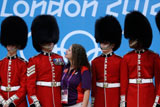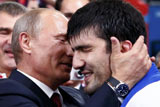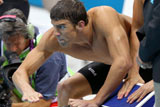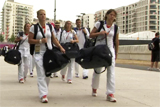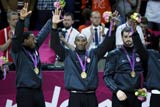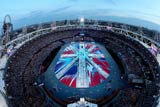London raises bar on greening the Games
Updated: 2012-07-13 17:47:05
( Agencies)
|
|||||||||||
Not all success
London's efforts haven't all been successful.
The organisers failed to generate 20 percent of the park's energy needs from renewable sources after planners pulled the plug on a large wind turbine and opted for a combined heat-and-power plant fuelled by natural gas instead.
But they still managed to meet the overall 50 percent emissions reduction goal by agreeing to help fund the London Mayor's low-carbon scheme for schools and homes in the communities.
However, the WWF UK's Lewis said London organisers should have done a better job selecting their "sustainability" partners.
"Some of the Olympic sponsors have not used the Games to create a positive change for sustainability and therefore they are not adding to the legacy, they are not helping the Games be greener," he said.
WWF reckons a good Olympic partner should be a progressive business that shows green leadership in their sector and that breaks new ground in reducing the impact of the Games while applying sustainability pledges to their business afterwards.
Lewis cited EDF Energy and oil giant BP as examples of companies that could have done more.
"EDF and BP are sticking with old and problematic approaches to energy provision and resisting a safer, cleaner and more affordable energy future," he wrote in a blog in April. "They are dragging their heels at the back of the race to tackle climate change."
Sheila Williams, a spokeswoman for BP, denied the company was not providing leadership. She pointed to BP plans to offset the carbon footprints of all ticketed spectators' travel to the Games, which it has estimated at around 400,000 tonnes of carbon dioxide emissions, as an example of a BP initiative.
The company is also providing biofuels and cleaner engine oils to be used in the more than 5,000 official vehicles earmarked for the Games, she said.
Michael Stuart, an EDF Energy spokesman, conceded his company was unable to deliver a promised low-carbon fuel for the Olympic torch in time for London, but said it had successfully developed the fuel - derived from elephant grass - and that it would be available for future Games.
"Without the inspiration of the Games, this fuel would not have been developed," Stuart said in an email.
EDF is also installing real-time energy monitoring technology to help control and reduce energy use at Olympic venues, he added.
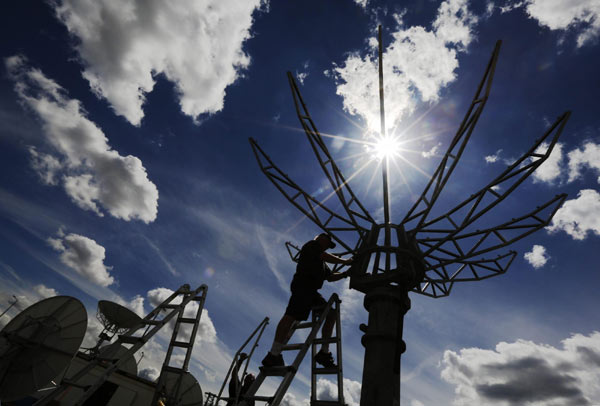 |
|
Workers construct satelite dishes for the world's media ahead of the Olympic Games in the London 2012 Olympic Park at Stratford in London, July 12, 2012. [Photo/Agencies] |
Legacy
Ultimately, London's success will be judged on its ability to deliver a lasting environmental legacy - decades from now, the organisers hope to see a permanent improvement to the area around the venues.
Once the Games are over in mid-August, the Olympic facilities will be turned over to the non-profit London Legacy Development Corp, renamed the Queen Elizabeth Olympic Park, and opened to the public in phases from the summer of 2013.
David Stubbs, LOCOG's head of sustainability and himself an avid bird watcher, said a variety of birds had been observed over the last couple of seasons since the new parklands were planted, including sand martins, grey wagtails, linnets and kestrels.
Medal Count |
||||
| 1 | 46 | 29 | 29 | |
| 2 | 38 | 27 | 22 | |
| 3 | 29 | 17 | 19 | |
| 4 | 24 | 25 | 33 | |
| 5 | 13 | 8 | 7 | |
| 6 | 11 | 19 | 14 | |


